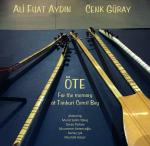

This CD is an attempt to remember or imagine the musical life of TANBURI CEMIL BEY (1873-1916), one of the most important composers of the Ottoman music, in its many forms: with other musicians around him playing their own repertoires, discussing music and culture, and developing ideas of culture permeating music. It aims to follow the musical dreams of CEMIL, which were embellished with the liveliest and most colorful music performances, dances, compositions, concerts, weddings and festivals of the period. The CD imagines an evening gathering with musical guests who had arrived from a distant Aegean island, from which the local sounds were carried over the sea on the wings of seagulls.
The time when TANBURI CEMIL BEY lived and produced music was the late Ottoman period and this was also a period which manifested cultural variety as a natural part of Ottoman life. This environment had an extraordinary diverse social life which consisted not only of the inhabitants of Istanbul with different ethnicities and religions, but also enabled cultural exchanges between them and people travelling to the capital from different regions in the Ottoman Empire – an others, especially from Europe. Therefore the period in which Tanburi Cemil Bey made his recordings in Istanbul reflected the cultural ambience of that time. The music culture supported a widespread urban classical music tradition and also very rich folk music and dance traditions from communities of Turks, Kurds, Greeks, Armenians and Jews, together with a fairly strong European classical music tradition as well. Cemil Bey was able to combine all these traditions into his music and use these different musical elements in his own style. His wide and multi-faceted capabilities, acted like a memory of Ottoman past musical traditions and a prominent influence on its future musical development. This CD is dedicated to following the legacy of Cemil Bey in the various genres and elements of Anatolian traditional music using his performances, compositions, compilations and theoretical writings and using this knowledge to remind us of the effect Cemil Bey had on the Turkish traditional musical life of today.
ALI FUAT AYDIN is a performer on the baglama, now a seminal musical instrument used in playing traditional Turkish folk music. His main area of expertise is in zeybek music. He was born in 1973 in a village called Ektirli which is in the Aydin region, close the to the west coast of Turkey. He graduated from the Middle East Technical University (METU) in Ankara (1998). After his graduation he continued to give baglama lessons, even whilst doing his military service. He has made significant contributions to the repertoire of Turkish folk music, collecting previously unknown melodies in several regions. He has mainly concentrated on agir zeybek which are slow zeybek tunes, especially as performed on the kaba zurna. His articles on musical subjects, mainly Turkish music, have been published in various journals and he has presented papers for various conferences abroad. Meanwhile, he has also made many studio recordings, given concerts, and contributed to radio and tv programs both as a musician and a researcher.
CENK GÜRAY, born in Ankara, obtained his engineering degree at the Middle East Technical University in Ankara, whilst simultaneously researching music. Recently he published a book comprehensively describing Turkish musical theory from both an historical and analytical perspective. He is a founding member of the DEM Trio band which fuses both classical and folk elements (check their CD The Fountain, (Felmay 2008). CENK GÜRAY is also very much involved in the jazz world, leading several bands playing ethno-jazz fusion, and has performed with them in various countries in Europe, as well as Turkey.
Our Playlist
Our olaylist on Spotify, dedicated to P
re Minimalism, Minimalism and Post Minimalism.
© 2025 Felmay Srl - P.I. 06974300011 | Powered by: Riccardo Marino


























